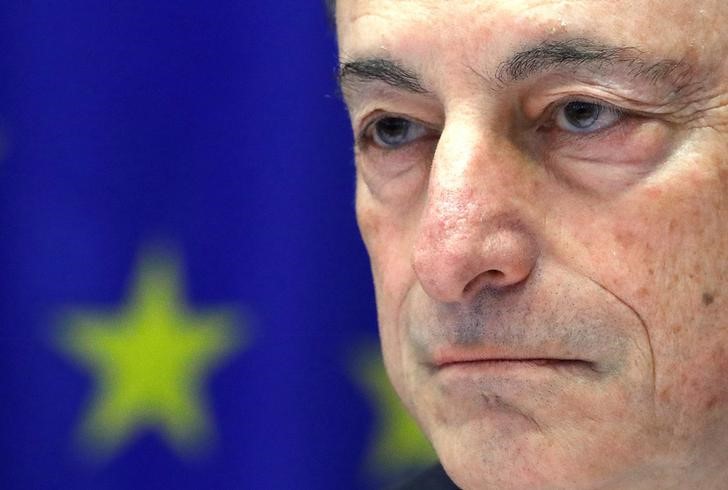By Dhara Ranasinghe
LONDON (Reuters) - Germany's record low short-term borrowing costs have further to fall as the ECB, faced with a scarcity of eligible bonds for its monetary stimulus programme, takes advantage of recent rule tweaks to buy more shorter-dated paper.
Traders say the German Bundesbank, acting on behalf of the European Central Bank, has been buying bonds below the minus 0.40 percent deposit rate in the past two weeks.
Speculation about further buying in this area is exacerbating demand for top-rated German debt and prolonging a move that is out of kilter with a pick-up in economic growth and inflation in the euro zone's biggest economy.
"What has changed since December is that the scarcity constraints, even if faced later in the year, are having an impact on policy today," said Frederik Ducrozet, a senior economist at Pictet. "That is the most important development and holds the most risks to markets."
Aware that the ECB is on the prowl, investors can't seem to get enough of German short-term debt, paying for the privilege of lending to the government through negative yields.
Germany sold two-year bonds at record low yields at auction of minus 0.92 percent on Tuesday.
"Every dealer wants to buy it because they want to sell it on to the central bank," DZ Bank strategist René Albrecht said.
To free up more bonds for its 2.3 trillion euro stimulus scheme, the ECB in December scrapped a rule that prevented it from buying bonds yielding below the depo rate or with a minimum maturity of less than two years.
Having signalled it would only buy bonds yielding below the depo rate as a last resort, the ECB took markets by surprise last month by using the first available opportunity to take advantage of the rule tweak.
According to Commerzbank (DE:CBKG), since the deposit floor restriction was removed in January, the Bundesbank has been increasing offers on German bonds with a one-year maturity to meet its 800 million euro daily target of asset purchases.
Rabobank puts the daily buying at around 625 million euros. Given that there is about 450 billion euros of outstanding German debt in the 1 to 5 year maturity range, Rabobank says it would not be unreasonable to assume that about two-thirds, or about 400 million euros, of the daily buying target is being diverted towards shorter-dated bonds.
Germany's two-year bond yield hit a record low of minus 0.96 percent
The scarcity of high-quality short-term debt, which is used as collateral in funding markets, is also driving yields lower.
Concern about France's presidential election has also boosted demand for low-risk German debt.
NEW DYNAMIC
But ECB buying is the main driver, suggesting that short-dated bond yields will be less effective in their traditional role as a gauge of how investors view the outlook for short-term interest rates.
Another side effect is a further steepening of the government bond yield curve, seen as beneficial for the banking sector.
"I think we're going to hit minus 1 percent on two-year bond yields within the next couple of weeks," said Martin van Vliet, senior rates strategist at ING.
Before Tuesday's auction, the outstanding volume of German two-year debt stood at 106 billion euros, according to German Finance Agency data. The agency plans to issue $52 billion in Schatz notes this year, down 1 billion on 2016.
Many banks expect the ECB to push up against a self-imposed limit that prevents it from holding more than 33 percent of a country's eligible bonds around year-end, even as it looks to reduce its overall monthly asset purchases by 20 billion euros to 60 billion euros from April.
"The bottom line is that the ECB is running out of German bonds to buy and that the programme is reaching its limits," said ABN AMRO (AS:ABNd) senior fixed income strategist Kim Liu. He says the bond-buying limits in Germany could be hit as early as June if the Bundesbank keeps buying at the current pace.
In Ireland and Portugal, where the ECB is also running out of eligible debt, the central bank has slowed its purchases and deviated from the so-called capital key, under which it buys bonds based on the size of a member state's economy.
It is seen as less willing to do that in Germany, where the bulk of QE purchases are made. Instead of slowing purchases, the ECB is likely instead to buy more shorter-dated bonds to keep the scheme going until its end-2017 end-date, analysts said.
The ECB could make further tweaks that free up more bonds, but that's seen as unlikely as stronger inflation and economic growth increases pressure on the bank to scale back QE.

"The nuclear option is abandoning the capital key - but they won't abandon that unless there was a crisis," Mizuho strategist Peter Chatwell said.